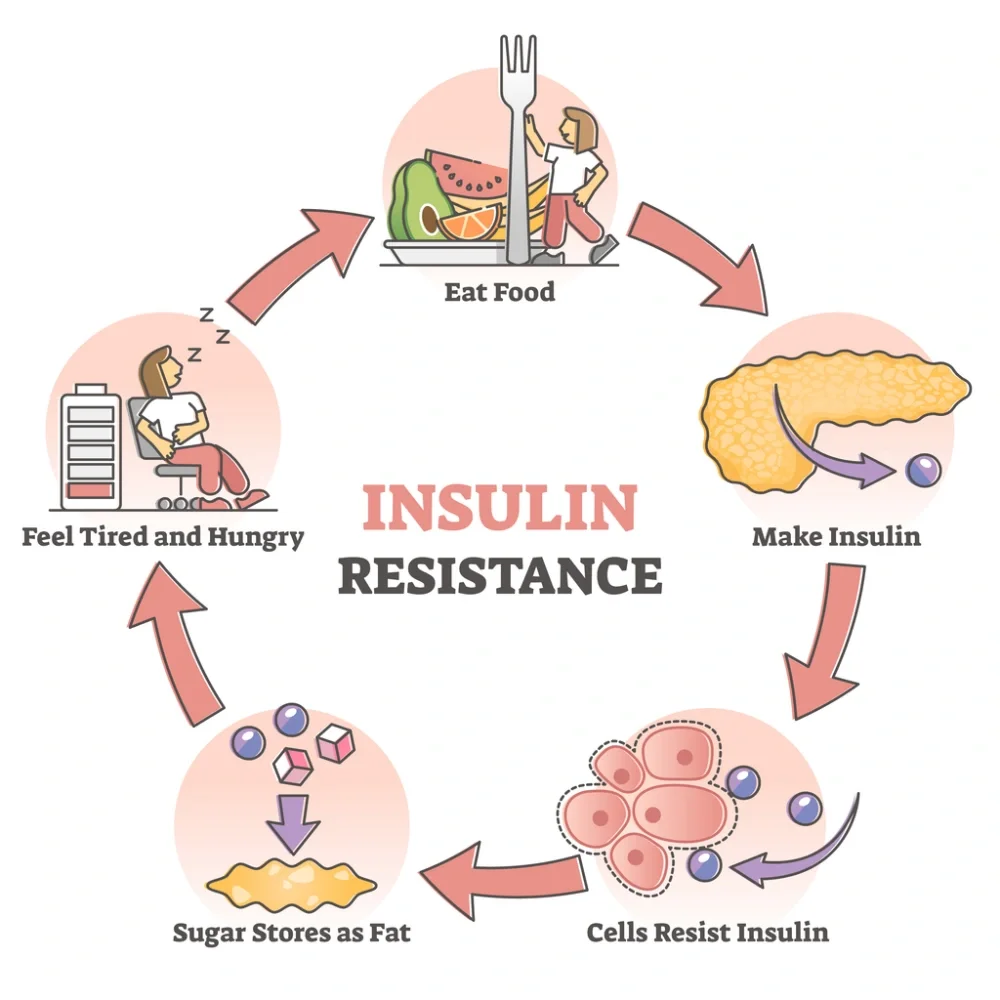Metabolic Syndrome, Insulin Resistance & Weight Loss Resistance
If you're struggling to lose weight, feeling inflamed, or constantly battling sugar cravings, the issue likely goes deeper than calories in, calories out. Metabolic dysfunction—especially insulin resistance—is one of the most common yet overlooked root causes of stubborn weight gain, energy crashes, and chronic disease risk.
In functional medicine, we don’t just focus on weight—we investigate why your metabolism isn’t working the way it should. From hormones and blood sugar to inflammation and gut health, we take a systems-based approach to restoring metabolic balance and sustainable weight loss.
What Is Metabolic Syndrome?
Metabolic syndrome is a cluster of risk factors that increase your chance of developing heart disease, diabetes, stroke, and other chronic illnesses. You don’t have to be “overweight” to have it—and many people are never told they’re at risk until it's too late.
Metabolic syndrome is typically diagnosed when you have three or more of the following:
High blood sugar or insulin resistance
High blood pressure
High triglycerides
Low HDL (“good”) cholesterol
Increased abdominal fat or waist circumference
What Is Insulin Resistance?
Insulin resistance occurs when your cells stop responding to insulin—the hormone that helps shuttle glucose (sugar) into your cells for energy. When this happens, your body produces more and more insulin, leading to:
Fatigue
Weight gain (especially belly fat)
Sugar cravings
Blood sugar crashes
Hormone imbalances
Inflammation
And eventually: prediabetes or type 2 diabetes
Signs of Metabolic Dysfunction
Even if you haven’t been diagnosed with metabolic syndrome, you may be experiencing signs of underlying metabolic stress, such as:
Difficulty losing weight despite diet and exercise
Belly fat or puffiness around the midsection
Cravings for sugar or carbs, especially in the evening
Feeling hungry again soon after eating
Fatigue after meals
Mood swings or irritability when hungry
Skin tags, darkened neck or armpits (acanthosis nigricans)
Irregular periods, PCOS, or hormone imbalances
Poor sleep, snoring, or waking frequently
High cholesterol or blood pressure
Brain fog or low motivation
Weight Loss Resistance in Women
Women often face unique challenges related to weight and metabolism, especially with:
Hormonal fluctuations (PMS, perimenopause, postpartum)
Estrogen dominance or low progesterone
Cortisol dysregulation from chronic stress or under-eating
Thyroid dysfunction (especially subclinical hypothyroidism)
Overtraining or undereating, which slows metabolism
Weight Loss Resistance in Men
Men may experience:
Low testosterone linked to insulin resistance and belly fat
Chronic stress raising cortisol and storing fat
Poor sleep or sleep apnea impacting glucose metabolism
Fatty liver or high triglycerides related to blood sugar imbalance
Sedentary lifestyle or work stress without recovery
What Causes Metabolic Dysfunction?
There is rarely a single cause of metabolic syndrome or weight gain. In functional medicine, we identify and address multiple overlapping drivers, such as:
Chronically elevated insulin and blood sugar
Nutrient deficiencies (magnesium, chromium, omega-3s)
Mitochondrial dysfunction impairing fat burning
Gut imbalances increasing inflammation and cravings
Environmental toxins (plastics, pesticides, heavy metals) that disrupt metabolism
Sleep deprivation or circadian rhythm dysregulation
Overexposure to processed food and seed oils
Thyroid or adrenal imbalances
How Functional Medicine Supports Metabolic Health & Weight Loss
Instead of restrictive diets or one-size-fits-all protocols, functional medicine helps you restore metabolic flexibility—so your body can burn fat, balance blood sugar, and maintain energy naturally.
Your personalized plan may include:
Comprehensive lab testing (glucose, insulin, A1C, lipids, hormones, thyroid, inflammation)
A real-food, anti-inflammatory nutrition plan (e.g., Paleo, low-carb, or carb-cycling)
Blood sugar tracking or CGM (continuous glucose monitoring)
Nutraceutical support (berberine, inositol, magnesium, ALA, chromium, fish oil)
Stress reduction techniques and adrenal support
Mitochondrial and liver detoxification support
Personalized movement plan (walking, strength, HIIT, or nervous system-safe options)
Sleep optimization and circadian rhythm syncing
Coaching on sustainable habit change—not crash diets
Note: If your metabolism feels “broken” or you’ve been told to just “eat less and exercise more,” functional medicine offers a deeper, more compassionate path. You don’t need another fad diet—you need to uncover and heal what’s keeping your body stuck in survival mode.



